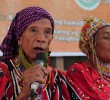THE lowly malunggay, which is being eyed by the Department of Agriculture (DA) as a solution to hunger, poverty and chronic malnutrition suffered by women and children in the country, is now also being considered as a potential source of biofuel.
At least two government agencies will seriously look into the biofuel potential of malunggay oil and has extended the invitation to local biotech company Secura International Corp. to discuss the market possibility.
Secura has pioneered in the extraction of oil from the seed of malunggay, scientifically known as Moringa oleifera. The Philippine Agricultural Development Commercial Corporation (PADCC), a corporate arm of the DA, and Dr. Virginia Teodocio, a member of the National Biofuels Board (NBB), had asked Danilo Manayaga, Secura president and chief executive officer, to make a presentation after a study made by a team of graduating students from the Massachusetts Institute of Technology (MIT).
The MIT experts confirmed Manayaga’s claim that malunggay oil can be a major source of biofuel, next to coconut.
Marco Magpili Jr., PADCC vice president, was amazed at the findings. The cultivation of Moringa can produce massive amounts of oil that can boost the supply of raw materials needed to produce the biofuel the country needs.
Magpili was also considering the possibility of intercropping malunggay with coconuts, which can boost farmers’ income in every square foot of land.
Teodicio, a Department of Energy (DOE) consultant, was wondering whether oil produced from a malunggay seed can pass international standard, such as the European and U.S. standards for vegetable oil.
According to studies, malunggay can be a source of “healthy oil” because of it has low transfatty acid. Just like coconut oil, it can also be used for personal health-care products, for cooking, or diesel oil. The seed of malunggay is 36 percent oil.
Manayaga, a chemical engineer also said that pure oil can be extracted from the seed of malunggays, through the use of biotechnology.
With the support of the DA biotchnology office, Secura has been promoting the massive cultivation of malunggay. The government agency is pushing for the cultivation of the “miracle tree” to help fight hunger, poverty and chronic malnutrition suffered by women and children in the Philippines .
In Caraga, the regional agriculture office adopted malunggay as the chief crop for its “One house, One vegetable” program. In Manila , DA launched its urban farming program called “Malunggay in the City” to encourage more people to plant malunggays in their backyards.
The local biotech company said it is willing to buy malunggay seeds for the production of Moringa oil, requiring at least 500,000 hectares of agricultural land planted with the crop.
PADCC has earlier been promoting the massive cultivation of jatropha, locally known as tuba-tuba, a move opposed by farmers’ groups because they attracted foreign owned plantations who are fast encroaching on their agricultural lands and aggravates food deprivation among poor Filipinos.
IMPORTANT NOTICE: INBOX is an archive of press releases, statements, announcements, letters to the editors, and manifestos sent to Davao Today for publication. Please email your materials to davaotoday @ gmail.com. Davao Today is not responsible for the content of these materials. The opinion expessed in these items does not reflect those of Davao Today and its staff. Please refer to our terms of use/disclaimer.










